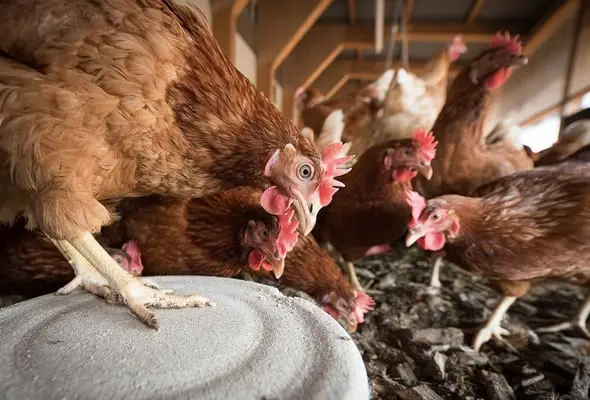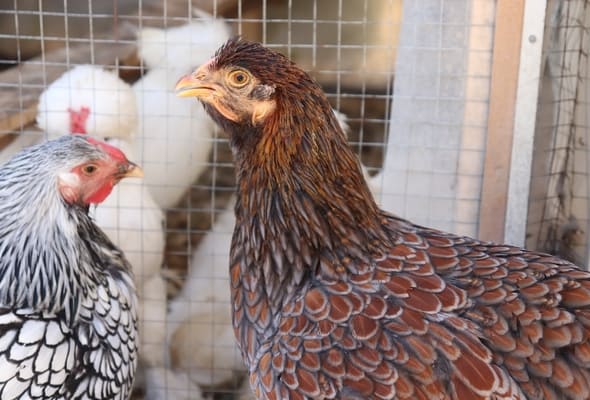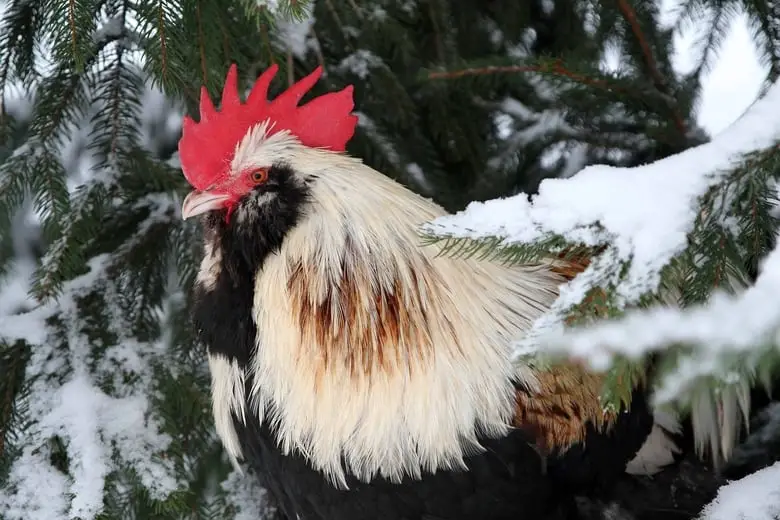Keeping backyard chickens is an attractive prospect. Aside from providing fresh eggs, these curious fowl are entertaining to watch and make low-maintenance pets with an upside that saves you money on your grocery bill. However, if you didn’t grow up on a farm, you may be wondering if it’s possible to keep chickens outside year-round. Can chickens live outside in the winter?
Can Chickens Live Outside in the Winter?
Yes, chickens can live outside in the winter. While you still need to provide them an indoor space to get out of the cold, they don’t need to be brought indoors. If you already have a solid chicken coop, there are a few things you can do to winter-proof it to ensure your hens will be warm and happy.
Chickens are incredibly resilient creatures well-adapted to harsh climates. With multiple layers of feathers and dense bodies, these birds are insulated against the wind and snow.
Raised and kept across the globe, chickens have thrived in areas as diverse and wide-ranging as Greenland and the Sahara desert. Although originally from the jungles of China, these fowl have been bred and developed for certain traits and features that assist them in a variety of environments.
While chickens can withstand sub-freezing temperatures, they shouldn’t have to, and generally prefer to keep out of harsh weather conditions when they can. That said, even in multiple feet of snow, chickens are known to venture outside and scavenge the wintry ground for edibles.
There are a number of breeds that are better suited to living in the cold, which are worth considering for those who live in areas with long and dark winters. In this article we’ll go over some of these breeds, how you can prep your coop for winter, as well as address how they survive such inhospitable conditions.
How do Chickens Survive the Winter?
As we’ve alluded to above, chickens have a thick coat of feathers that protects them against the cold and wind. Much like your own winter jackets, their feathery jacket insulates and preserves body heat, keeping their internal body temperatures high even in freezing conditions.
Chickens understand their limits. While being compared to a chicken is often used as an insult meant to convey cowardice or stupidity, these birds are smarter than we think.
Hens will typically not venture outside their coop if they feel discomfort or at risk of freezing. Trust that your chickens will know what’s best for them, and don’t be alarmed if you see a hen wandering around in three feet of snow.
You’ll notice that they adopt different stances and postures to help them retain heat. By sitting on a roost with their legs tucked beneath them and with their heads kept close to their bodies, they will limit the exposed surfaces of their body to prevent heat from escaping.
How Can I Prepare My Coop for Winter?
While they can survive for long periods in the cold, you’ll need to also provide them with the option to go indoors. Although this doesn’t mean hosting them in your guest bedroom, you will have to equip and insulate their coop to withstand wintry blasts and melting snow.

Above all, ensure that your chickens are dry and have a place to shelter from the wind. Birds that are wet freeze easily and cannot regulate their body temperature. This can be accomplished with a sheet plastic covering or foam insulation. However, keeping them out of the wind and rain is the bare minimum and should be a given.
Smaller coops are easier to heat and will often be kept warm simply from the body heat of your flock. For this reason, a larger flock will also do better in the winter, as the more there are, the more they can huddle together and share warmth.
For people keeping 3-10 hens, you may want to consider purchasing a heat lamp or miniature heater designed for chicken coops. A small flock is unlikely to be able to keep itself warm, and can benefit greatly from an additional heat source. Just be careful to prevent birds from colliding with or scratching heaters/lamps, as broken heaters can cause fires. Refer to online material when setting one up.
Lastly, make sure your hens have access to clean water and fresh food at all times. Without these your birds are incapable of caring for themselves or regulating their internal temperatures. Specialized heaters can be purchased to prevent water bowls from freezing over.
What Breeds Survive Best in Winter?
There are a number of chicken breeds that are especially well suited for winter. These typically come from northern European countries and states in the US. They possess traits and characteristics that have been specially selected to help them thrive and stay productive even under inhospitable conditions.

Of these specialized traits, the most important are size and feathering. Larger laying hens with more rounded bodies will fare better, as a larger body produces more heat. Birds with denser feathering, or feathering that covers more of their body, will also conserve more heat, trapping it beneath their plumage.
Chickens with shorter wattles are less likely to become frostbitten and more likely to venture into the cold. Larger wattles help let off heat, a feature which is useful in hot climates but detrimental in cold ones.
Several hardy winter breeds include Barred Rocks, Buff Orpingtons, Wyandottes, Jersey Giants, Buckeyes, Australorps, Speckled Sussex, and Delawares. These are all heritage, dual purpose breeds, which are meatier than their factory farmed counterparts and great for homesteaders.
Can Chickens get Frostbite?
Unfortunately, chickens can suffer from frostbite. Typically this occurs when water gets on the bird’s wattle and the animal is unable to take refuge in a dry location. However, hens can still get frostbite even if the appropriate conditions are met.
You’ll know your chicken has frostbite if a dark scab (often black) develops on its wattle or around its eyes. It will look very much like a normal scab and can cover the entire area of exposed skin.
A slightly frostbitten waddle can sometimes heal on its own, while in cases with severe frostbite the frostbitten area of the wattle may fall off. While alarming, it is not the end of the world. The skin will not grow back, but your bird should otherwise be fine.
Despite this, you’ll want to do everything in your power to protect your hens from becoming frostbitten in the first place. As we’ve stated above, the best way to do this is by providing them a safe and warm indoor environment.
If you experience especially harsh winters, you can also coat your chickens’ wattles in vaseline. Vaseline will provide an extra layer of protection that insulates the skin from the cold, helping it retain its natural oils and preventing it from drying out.
Conclusion
As we’ve learned, chickens can survive outside in the winter. While capable of surviving outside, you still should provide them an indoor refuge, preferably an insulated chicken coop. Along with a secure coop, you’ll also need to give them unlimited access to fresh food and water. Heaters can be useful depending on the size of your flock, but should be installed with caution.
As long as you meet these requirements, your birds should be okay. However, you may want to go out of your way to acquire winter-hardy breeds, as they will typically fare better and continue laying even through the dead of winter.

